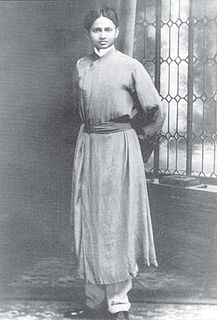A Quote by Swami Paramananda
We become our own enemy when we are thrown out of balance by anger, hatred, grief, or any other intense emotion. We are for the time being obsessed by something alien.
Related Quotes
Anger is always concerned with individuals, ... whereas hatred is directed also against classes: we all hate any thief and any informer. Moreover, anger can be cured by time; but hatred cannot. The one aims at giving pain to its object, the other at doing him harm; the angry man wants his victim to feel; the hater does not mind whether they feel or not.
Grief allows you to let go of something you have lost only when you begin to accept what you now have in its place. As our mind clings to the familiar, to our established expectations, we can become trapped in feelings of disappointment, confusion, anger, that create our own internal worlds of suffering.
Sensory experience does not offset the intense pain or pleasure we feel on a mental level; it may distract us, but doesn't overcome it. On the other hand, if we have peace of mind, even negative experiences do not upset us. Peace of mind is also good for our physical health. Medical experts have found that anger, hatred and fear eat into our immune system. Being calm and relaxed is better for our physical well-being.
There is nothing wrong with anger. Anger is a beautiful emotion, as valid and rich as joy or laughter. But you have been taught to repress your anger. Your anger has been condemned. If anger is unexpressed, it will slowly poison you. The key is to know how to express your anger. Do not throw it out onto any one. No one is responsible for your anger. Simply express your anger. Beat up a cushion. Go for a run. Express your anger to a tree. Dance your anger. Enjoy it.
Grief is real because loss is real. Each grief has its own imprint, as distinctive and as unique as the person we lost. The pain of loss is so intense, so heartbreaking, because in loving we deeply connect with another human being, and grief is the reflection of the connection that has been lost. We think we want to avoid the grief, but really it is the pain of the loss we want to avoid. Grief is the healing process that ultimately brings us comfort in our pain.
Like any good drug, anger can mask all reality. But anger is not an easy emotion to call up on demand, which is why an enemy is so wonderful. You're tired. Didn't sleep well. You have zero energy. Then you get lucky. You pull into the boathouse parking lot and see your favorite enemy. Celebrate. Your workout is saved. One look at that chowderhead can put you into the angerzone. As you turn off your car, you can feel your whole physical being change. Respiration increases. The dull look on your face is magically transformed into the power-stare of a true rowing warriot.
Hatred as an element of the struggle; a relentless hatred of the enemy, impelling us over and beyond the natural limitations that man is heir to and transforming him into an effective, violent, selective and cold killing machine. Our soldiers must be thus; a people without hatred cannot vanquish a brutal enemy.
I always encourage people who had a loss of any kind that you find something to focus on that takes you out of that horrific sorrow. And you have to go through it. No way out but through in the grief. But don't remain in the grief. You know, find something that you can nurture as you would that being that you loved.
When poets die, other poets take it personally, almost as an affront. A lot of us "left behind" are thinking that poetry is the one thing keeping us alive and present, so what does it mean when one of our ranks chooses to end his or her life? There's an anger beneath the grief, you know? That anger and grief, in turn, breeds other poems from those of us left behind.
But you can’t get to any of these truths by sitting in a field smiling beatifically, avoiding your anger and damage and grief. Your anger and damage and grief are the way to the truth. We don’t have much truth to express unless we have gone into those rooms and closets and woods and abysses that we were told not go in to. When we have gone in and looked around for a long while, just breathing and finally taking it in – then we will be able to speak in our own voice and to stay in the present moment. And that moment is home.
It is best if we do not listen to or look at the person whom we consider to be the cause of our anger. Like a fireman, we have to pour water on the blaze first and not waste time looking for the one who set the house on fire. "Breathing in, I know that I am angry. Breathing out, I know that I must put all my energy into caring for my anger." So we avoid thinking about the other person, and we refrain from doing or saying anything as long as our anger persists. If we put all our mind into observing our anger, we will avoid doing any damage that we may regret later.
Successful prime-time television of any genre produces some kind of emotional reaction in the viewers. There are a lot of different emotions to tap into. The emotion of the reward of discovery, the feeling of righteous anger, the feelings of pathos and sadness, or sentimentality of being moved by something.
The real troublemakers are anger, jealousy, impatience, and hatred. With them, problems cannot be solved. Though we may have temporary success, ultimately our hatred or anger will create futher difficulties. Anger makes for swift solutions. Yet, when we face problems with compassion, sincerity, and good motivation, our solutions may take longer, but ultimately they are better.






































